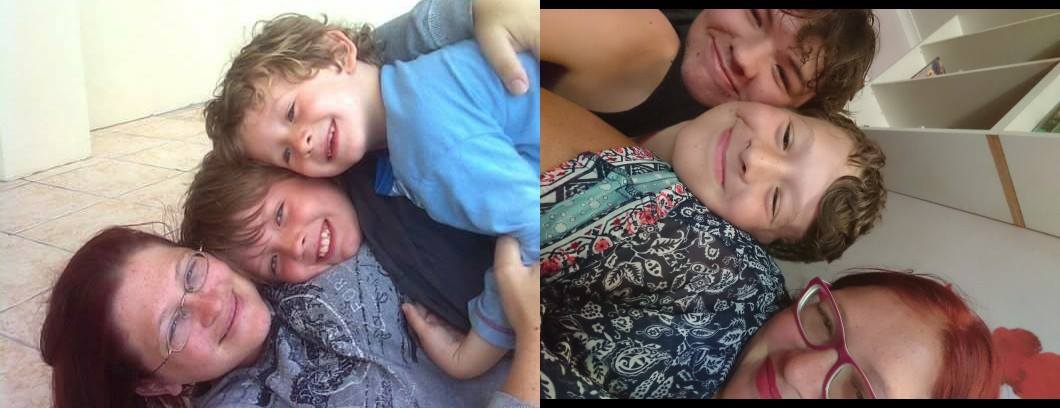So I offered to write something for Brett about parenting a child with Aspergers, and I immediately went blank. What do I know? Sure, Tim, my son is nearly 16, and he has Aspergers. But what can I tell you that might be helpful? I dithered, wrote things, deleted them. Tried again. And so finally I decided, let me write up the questions I most commonly get asked, and the answers I try to give.
But before that, a quick story about us. Tim is nearly 16, his little brother is 11, and I am 35. That’s our little family, and we muddle along. My son has certain obsessions – cars, Lego, Titanic, Transformers. I don’t quite think you can understand obsession until you’ve met someone on the spectrum. It’s an in depth knowledge, and a fixed and concerted interest. It’s researching until you could write entire books on the subject. It’s noticing that the tiny figure on the bottom right corner of the box you got has a slightly different shade of green on his shirt from the one that the actual toy is wearing. My son is helped by his near photographic memory, the vocabulary of a professor, and a high speed internet connection.
Which is all by way of explaining how our recent holiday to Mozambique was coloured, delightfully, by my son’s Aspergers. Nobody else, I guarantee, buys a notebook and pen on arrival in Maputo to facilitate the writing of a list of cars that you don’t find in Cape Town. Nobody else carries back from an island a vast collection of empty cooldrink cans and bottles because they are in Portuguese, and therefore collectable. Nobody else, at 1am on New Years, finds themselves photographing Transformers who have been posed to celebrate, including a glow stick and some beer cans, strictly as props. And I can tell you now, those people are missing out.
So back to the questions I get asked by friends who are trying really hard to understand my son. For which I love them dearly.
What is Aspergers? It’s a neurological condition. It’s not a mental illness, this is very important to note. It’s not a mental illness, there is no “cure”, and to imply that people would even want a cure is wrong. It affects your social interactions, your communication skills, and the flexibility of your thinking. Many people with Aspergers, or autism (they’re the same thing, really, traditionally Aspergers is the label given to those with a higher IQ) have other conditions – my son has dyspraxia, for example.
What does the spectrum mean? It’s not a 0 to 100 thing, as many people perceive it. The spectrum means that every single person with Aspergers is different. They all have attributes on the spectrum, to varying degrees. For example, some might really struggle with social interactions but communicate easily, others might be practically non-verbal, etc. Every single person is different. I think that’s why I struggled to start writing this. I know my son, but that doesn’t REALLY mean I know about other people on the spectrum.
What are some of the struggles? Every day I learn something from my son. He is wise, and funny, and brave. But he has to be. Almost every situation that we find normal, is hard for him. School has been a huge challenge. Being in a large group of people. Comparing yourself to everybody. Not understanding the social cues. My son gets on easily with adults, and loves kids, but people his own age are the biggest struggle, trying to fit in, to know what’s expected socially. My son was badly bullied, and moved from school to school. I constantly felt like I was doing battle, people who weren’t interested in trying to accommodate difference. Who perceived difference as wrongness. The pettiest battles were fought – he wanted to sit on the floor, and not at a desk. This was unacceptable. I could write screeds about the battle to get my son educated, but I will say that we have now found the most amazing College, and he is doing stunningly well. He also skipped two grades along the way, because he is ridiculously smart. Every day is still a struggle.
Bound by logic: one of the reasons school doesn’t make sense, is that my son, and many on the spectrum, are driven by logic, and justice. Things need to make sense. “Because” is no kind of answer at all. So, to convince a kid that they have to learn about the major exports of a country when they are adamant they will have no practical use for this information in their lives, well, it’s hard. On the plus side, this sense of logic, and justice, mean that a lot of the lazy ways of thinking, stereotyping, and perceiving the world pass people on the spectrum by. Apartheid, and racial discrimination of any kind, makes no sense. Last year my son learned a lot in gender studies about how women have been treated historically and are still discriminated against, and it made no sense to him. He offered me a hug, and a deep sense of outrage. He did a project about teen suicide among LGBT kids. It’s quite common for those on the spectrum, for example, to find gender norms confusing – they don’t pick up the social conditioning, so why boys should like certain things and girls others is completely nonsensical to them. Like what you like.
It takes a whole family – Tim’s Aspergers doesn’t only affect him, but everyone around him. It’s been great to see my family figure out, adapt, and include. This is something you can hope a family will do, but sadly the outside world just won’t. And as long as the outside world remains hostile to difference, the home needs to be carefully maintained as a safe space.
BIG THING I WANT TO DEBUNK: every time a white person shoots a lot of people, somehow mental illness gets blamed, and Aspergers often gets bandied around. In every instance I’ve looked into, this has been an after the fact diagnosis by a journalist or TV doctor who never met the person concerned, or a vague “may have been diagnosed”. The fact is that people on the spectrum are far less likely than those of us not on the spectrum to be violent towards others. They do have a higher risk of hurting themselves. Every time this stupid myth gets spread, it increases prejudice against people like my son. And that prejudice is very real. People on the spectrum are 10 times more likely to encounter the police, because they don’t react to situations in ways that are deemed “normal”. Also, they are bullied, ostracised, and attacked for being “different”.
Smaller things to debunk: people on the spectrum aren’t emotional. This varies hugely from person to person. My son for example is oversensitive, highly attuned to the emotions of everyone around him. People on the spectrum have no sense of humour: again, varies from person to person. My son is way funnier than I am, and I am paid to be funny for a living. I realied this when he was about ten, and in response to a demand from his younger brother, simply stared at him and exclaimed “I am not your protocol droid!” Nerd joke, for those who don’t get it.
What do you need to parent a kid on the spectrum? Patience. Oodles and oodles of patience. A support system – finding the right psychologist for my son has absolutely changed his life, and mine. Dogged determination – keep putting one foot in front of the other, and eventually you’ll find that you have indeed made progress. Conviction – trust your instincts, you know your child. If you think that they need something, fight for it. If you believe they are being mistreated, fight for them. Fight, fight, fight. Research. The internet has a lot of information, but find support groups, experts, people who have kids on the spectrum, and ask them questions. Also – gratitude. Your kid is awesome and amazing, and you are lucky to have them. My son is totally my hero.
Here’s what he wrote last year for Autistic Pride Day:
[For other stories of people living with special needs or challenges, click here]







point clearly communicated. this article is really educative and touching too!
Thank you so much for stopping by!